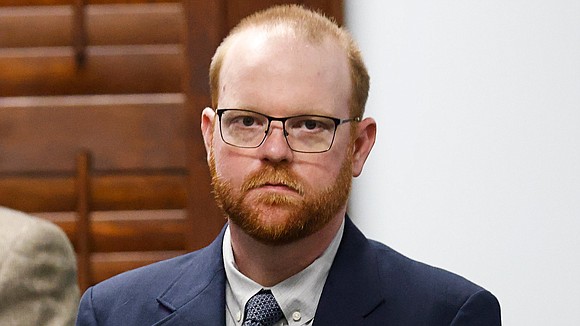Travis McMichael gets 2nd life sentence for federal hate crime conviction in Ahmaud Arbery's killing
CNN/Stylemagazine.com Newswire | 8/8/2022, 11:52 a.m.

Originally Published: 08 AUG 22 08:55 ET
Updated: 08 AUG 22 12:39 ET
By Dakin Andone and Alta Spells, CNN
(CNN) -- Travis McMichael, one of the three White men convicted in the killing of Ahmaud Arbery, was sentenced Monday to life in prison plus 10 years after his federal convictions this year on interference with rights -- a hate crime -- along with attempted kidnapping and weapon use charges.
His father Gregory McMichael and their neighbor William "Roddie" Bryan are due to be sentenced later Monday at the same Georgia courthouse on convictions of the same federal charges. All three already are serving life sentences for their convictions in state court on a series of charges related to the killing of the 25-year-old Black man, including felony murder.
"My son was shot not one time, not two times, but three times," Arbery's mother Wanda Cooper-Jones said before Travis McMichael's sentence was handed down, as she and other members of Arbery's family asked the judge to give him the maximum possible sentence under federal guidelines.
"Your honor," she said, "I feel every shot that was fired every day."
Arbery's killing, months before the police killing of George Floyd in Minneapolis, were in some ways harbingers of the nationwide protests that erupted that summer as demonstrators decried how people of color sometimes are treated by law enforcement.
McMichael, his father and Bryan were found guilty of the federal charges in February, with the jury accepting prosecutors' argument the defendants acted out of racial animus toward Arbery. McMichael, who fatally shot Arbery, was also found guilty of using and carrying a Remington shotgun while his father, Gregory McMichael was found guilty of using and carrying a .357 Magnum revolver.
Travis McMichael's life sentence, along with 20 years on the attempted kidnapping charge, is to be served concurrently with his state sentence, US District Court Judge Lisa Godbey Wood ruled Monday, with the additional 10 years on the weapons charge to be served consecutively. The judge ruled McMichael did not have the funds to pay a fine.
McMichael's attorney Amy Lee Copeland argued Monday for her client to remain in federal custody and to serve out his prison term with the Federal Bureau of Prisons rather than the Georgia Department of Corrections.
McMichael fears for his life in a state prison, Copeland said, telling the court he'd received "hundreds" of threats. Forcing him to serve the time in a Georgia state prison would essentially amount to a "backdoor death penalty" that could leave McMichael vulnerable to "vigilante justice," she argued, acknowledging the "rich irony."
Prosecutors opposed the request. In cases in which a defendant faces charges in separate jurisdictions, they argued, the one that issues its sentence first takes precedence.
The judge apparently agreed, telling McMichael she had "neither the authority nor the inclination" to override the rules.
To make their case, federal prosecutors focused on how each defendant had spoken about Black people in public and in private, using inflammatory, derogatory and racist language.
Prosecutors and Arbery's family had said he was out for a jog -- a common pastime for the former high school football player -- on February 23, 2020, when the defendants chased and killed him in their neighborhood outside Brunswick, Georgia.
Defense attorneys argued the McMichaels pursued Arbery in a pickup truck through neighborhood streets to stop him for police, believing he matched the description of someone captured in footage recorded at a home under construction. Prosecutors acknowledged Arbery had entered the home in the past, but he never took anything.
The defense also argued Travis McMichael shot Arbery in self-defense as they wrestled over McMichael's shotgun. Bryan joined the pursuit in his own truck after seeing the McMichaels follow Arbery in their pickup as he ran; Bryan recorded video of the shooting.
Two prosecutors initially instructed Glynn County police not to make arrests, and the defendants weren't arrested for more than two months -- and only after Bryan's video of the killing surfaced, sparking the nationwide outcry.




